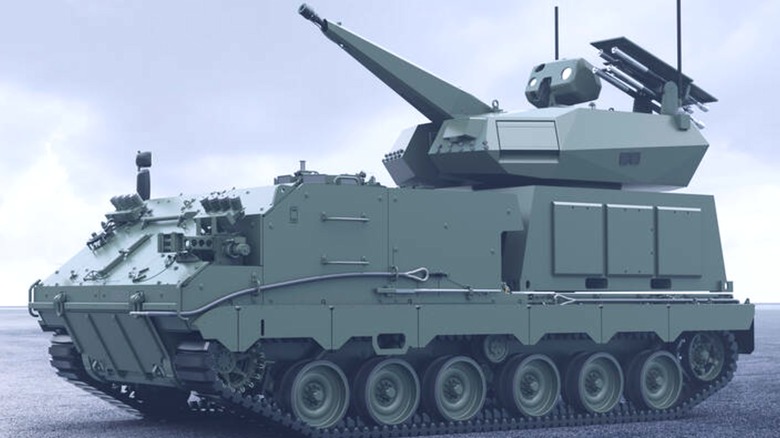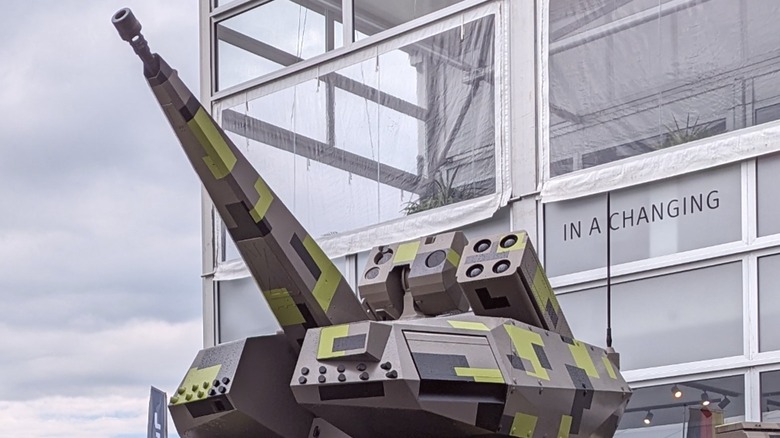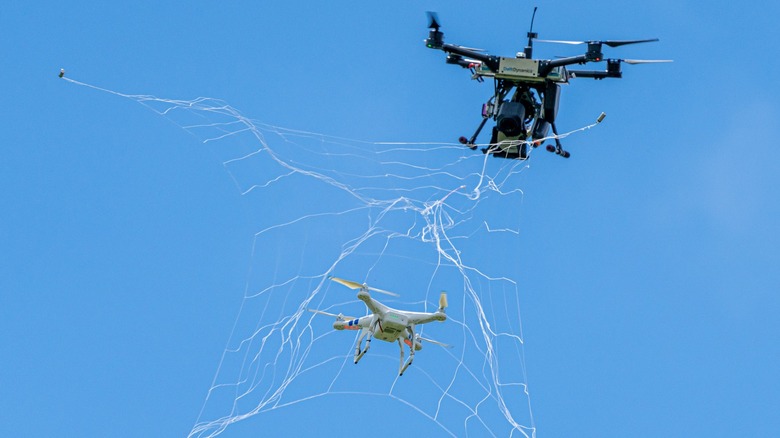Germany Is Counting On This Tech To Solve Its Drone Problem
Warfare is constantly evolving as new tactics, techniques, and technologies enter the fray, and the 21st century has seen many changes along these lines. Most notably, drones have shot to the forefront of modern warfare, and because they can be used for just about anything, militaries around the world are working hard to come up with the means to counter them. There are plenty of ways to take out a drone, including a Ukrainian tactic involving a Soviet-era prop plane and an assault rifle.
The Russo-Ukrainian War has proven the importance of drones as both offensive and defensive tools, and other European nations are taking note. Germany understands the need to counter drones and has developed impressive countermeasures to ensure its units' safety. However, the nation has only recently entered the drone game and lacks an effective defense against intelligence-gathering or attack drones. The country's army has several options, including foreign and domestically produced anti-drone measures.
Ultimately, the Bundeswehr (Germany's Armed Forces) settled on a relatively inexpensive method of drone countering via Rheinmetall's Skyranger air defense turret. As the name implies, the Skyranger is a weapon designed specifically to defend against airborne threats. Germany recently ordered 19 Skyrangers, though they won't be delivered until 2027. Previously, Germany used the Gepard anti-aircraft tank, but donated its stock to Ukraine, where it's proven effective against Russian drones. While waiting on their replacements, the Bundeswehr is developing a multi-layered defense system against enemy drones that includes civilian police and other agencies working together.
Rheinmetall's Skyranger air defense turret
Pictures of the Skyranger might lead some to believe it's a tank, but the system consists only of the turret and its sensors. This allows for the Skyranger to be mounted on all manner of vehicles, including tracked and wheeled armored vehicles, including tanks, armored personnel carriers, or trucks. The turret itself is a highly advanced technological achievement with programmable ammunition that's more than capable of taking out drones.
Rheinmetall describes the system as "a mobile ground-based air defense (GBAD) system which can be deployed against air targets at short and very short range and against ground targets." Its sensors enable 360-degree air and ground surveillance and work in tandem with the integrated 35 mm Oerlikon Revolver Gun. This functions as a Counter Rocket, Artillery, and Mortar (C-RAM) defense system, similar to the Phalanx CIWS, with a range of 2.5 miles. A 30mm revolver cannon has a range of 1.9 miles and is intended for short-range air defense.
The Skyranger family also includes a Search Radar Control Node, a missile system equivalent to a Stinger, and another missile system designated "Cheetah." The gun's ammunition can be programmed for air burst to take out a variety of airborne threats, making it an ideal counter-drone option for the Bundeswehr. That said, it's not the only anti-drone measure the military is taking in Germany as it awaits delivery of its new systems.
The Bundeswehr's other anti-drone techniques
Because the Bundeswehr is intent on developing a multi-layered defense against drones, it's not relying solely on the Skyranger. Germany is already training and using domestically produced interceptor drones. These fly up to a target drone to capture it with a net (pictured above). Anti-drone concerns aren't restricted to the German military. The country's police are also involved, and the two organizations are cooperating. In October 2025, the German government authorized its police to shoot down rogue drones, as countries have the right to protect themselves when drones breach their airspace.
This was done because of laws that limit the Bundeswehr's actions within the country. The police are called upon to address threats to airports and other facilities, while the military cannot. There are plans to increase the Bundeswehr's responsibilities within Germany, and it's likely the military will work with the police to shoot down drones flying over civilian areas. The Bundeswehr has already incorporated drone defense training throughout the force as the nation prepares for the growing threat drones pose.
Germany isn't alone, as other NATO nations look to the Russo-Ukrainian War, seeing just how important drones are to modern warfare. As time passes, Germany and its allies will continue to expand their air defense systems in anticipation of the threat. Additionally, Germany began arming its reconnaissance drones in 2022. While it took time for Germany to make the change, now that it has, the nation's drone technology is likely to improve as it seeks to increase both its offensive and defensive capabilities.


